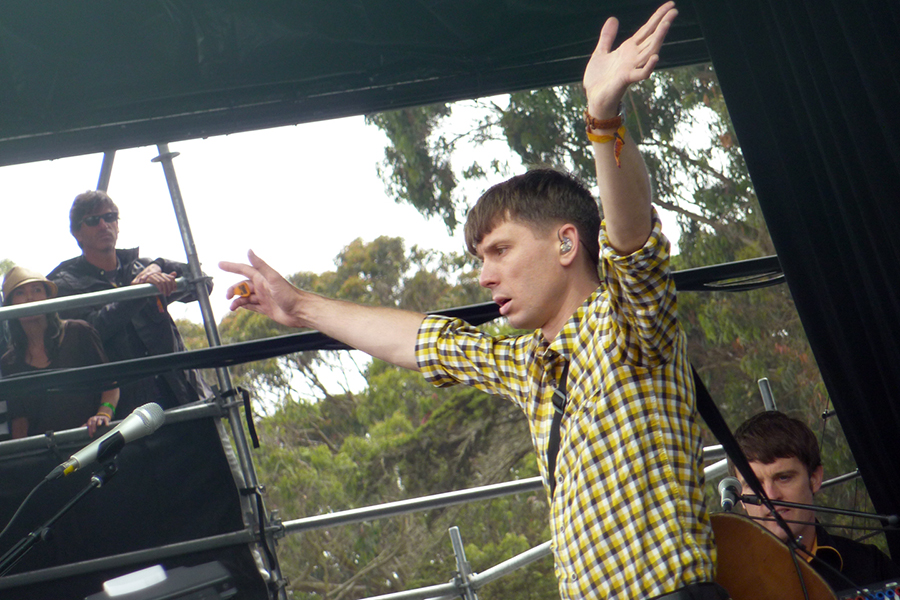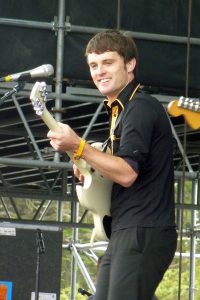Interview: No bones about Franz Ferdinand’s new sound

Franz Ferdinand performs at Outside Lands at Golden Gate Park in San Francisco on Aug. 12, 2012. Roman Gokhman/STAFF.
This story originally appeared in the Oakland Tribune.
The lads in Franz Ferdinand don’t even know his (or her) name, but they know they owe a great deal to a fifth member, without whom they would not have been able to nail down the dry percussion featured on their third album, “Tonight,” which hits shelves in January.
Live 105’s Not So Silent Night concert, featuring the Killers, Franz Ferdinand, Death Cab For Cutie, Bloc Party, more
6:30 p.m., Thursday
Oracle Arena
Tickets: $33-$58.
The band, set to make its first Bay Area performance in three years at radio station KITS-FM 105.3 (Live 105)’s Not So Silent Night concert Thursday at Oracle Arena, owes this unknown person a songwriting credit. That’s because his (or her) bones were used to make some “dry percussion” sounds.
“We bought the skeleton at an auction and it was in bits,” guitarist-keyboardist Nick McCarthy said in a recent phone interview. “I was trying to put it back together again but … I was having a bit of difficulty, so the bones were just laying around. In the middle of one night, we were recording (new track) ‘No You Girls Never Know,’ and we thought we needed some dry percussion here, some clicketyclack. We all just looked in the corner at the bones and started laughing.”
The band — McCarthy, singer-guitarist Alex Kapranos, drummer Paul Thomson and bassist Bob Hardy — aren’t worried their assistant’s ghost will come after them.
“We found a certificate that said they were leaving their body to rock ‘n’ roll,” McCarthy said.
That’s how the four ended up rattling teeth in a jar, hitting a pelvis with a femur and clapping bony hands, in their latest creative effort.
The provocative band came together in 2001 in Glasgow, Scotland. Three years later, it released a single, “Take Me Out,” and a self-titled album. The record won the prestigious Mercury Prize, awarded to the best album to come out of the United Kingdom or Ireland.
Perhaps propelled by their success overseas and the U.S., where Franz became a buzz band, the quartet quickly recorded a follow-up while still on the road. “You Could Have It So Much Better” was released in 2005 to mixed reviews. The band lost its buzz.
It was a rushed effort, McCarthy admits. That’s why the band first took a break before returning to Glasgow to write and record “Tonight.”
“I think we all felt we were frazzled and we didn’t want to write an album about being on the road,” he said. “We feel we write stronger music when we’re rooted somewhere.”
The band found an old, abandoned civic hall to use as a recording studio. They experimented with recording under the stage, in the corridors, even in the bathrooms. That’s where the skeleton came in, as well as other oddities such as Slinky toys hung from the ceiling for reverb.
After writing and recording way more songs than the album had room for, Franz Ferdinand took a year to play the new tunes in clubs around Europe. That’s where the band learned what worked and what didn’t.
“Some things you’re proud of, and some things you realize that, ‘I don’t want to play those in front of people; it’s really embarrassing,’” he said.
With the song selection completed, the quartet found a trend: All of the songs were about nighttime activities. So they structured the tunes to flow in a timeline of partying “from 6 p.m. to 6 a.m.” and called the album “Tonight.”
The high point of this night is the eight-minute-long “Lucid Dreams,” a bass-heavy jaunt into a dance club (the album version is completely reworked from the version streaming from the band’s Web site).
“You’re not thinking anymore and your head is throbbing in a good way,” McCarthy said.
The new songs also mark a shift in style for the band. Gone is the frenetic garage Brit-pop sound. It’s replaced by a slower and more methodical electronic sound, full of analog synths and grimy bass.
“The drums and the bass are what drives this record,” McCarthy said. “The guitar, which used to be one of the driving forces, has fallen away as a rhythmic element. That’s a big change for us.”
Follow editor Roman Gokhman at Twitter.com/RomiTheWriter.

